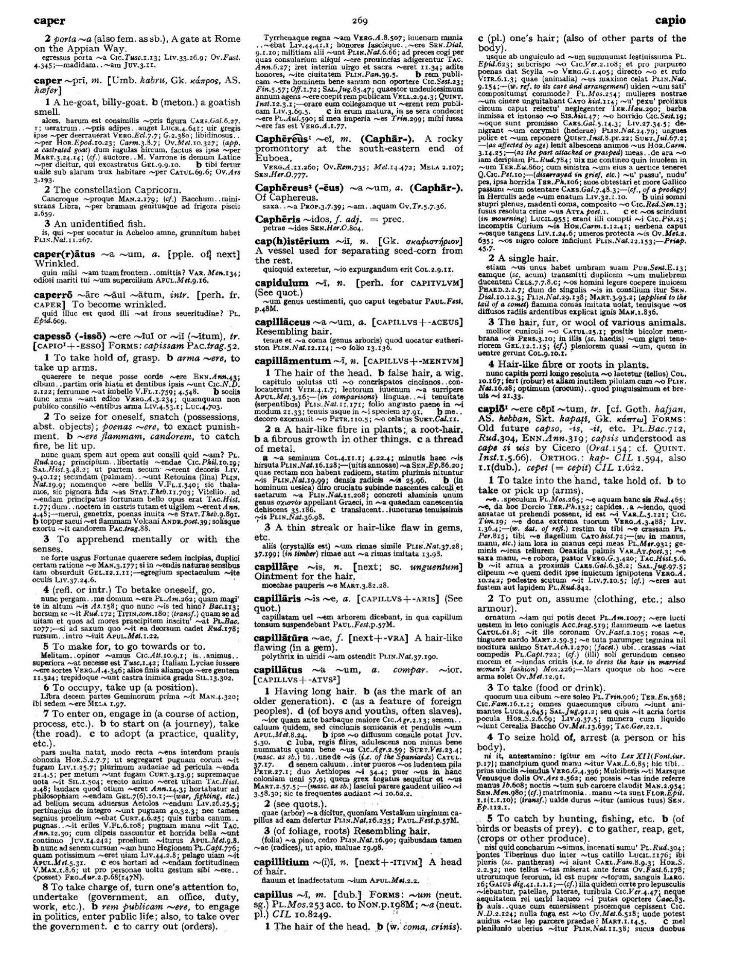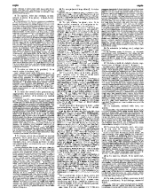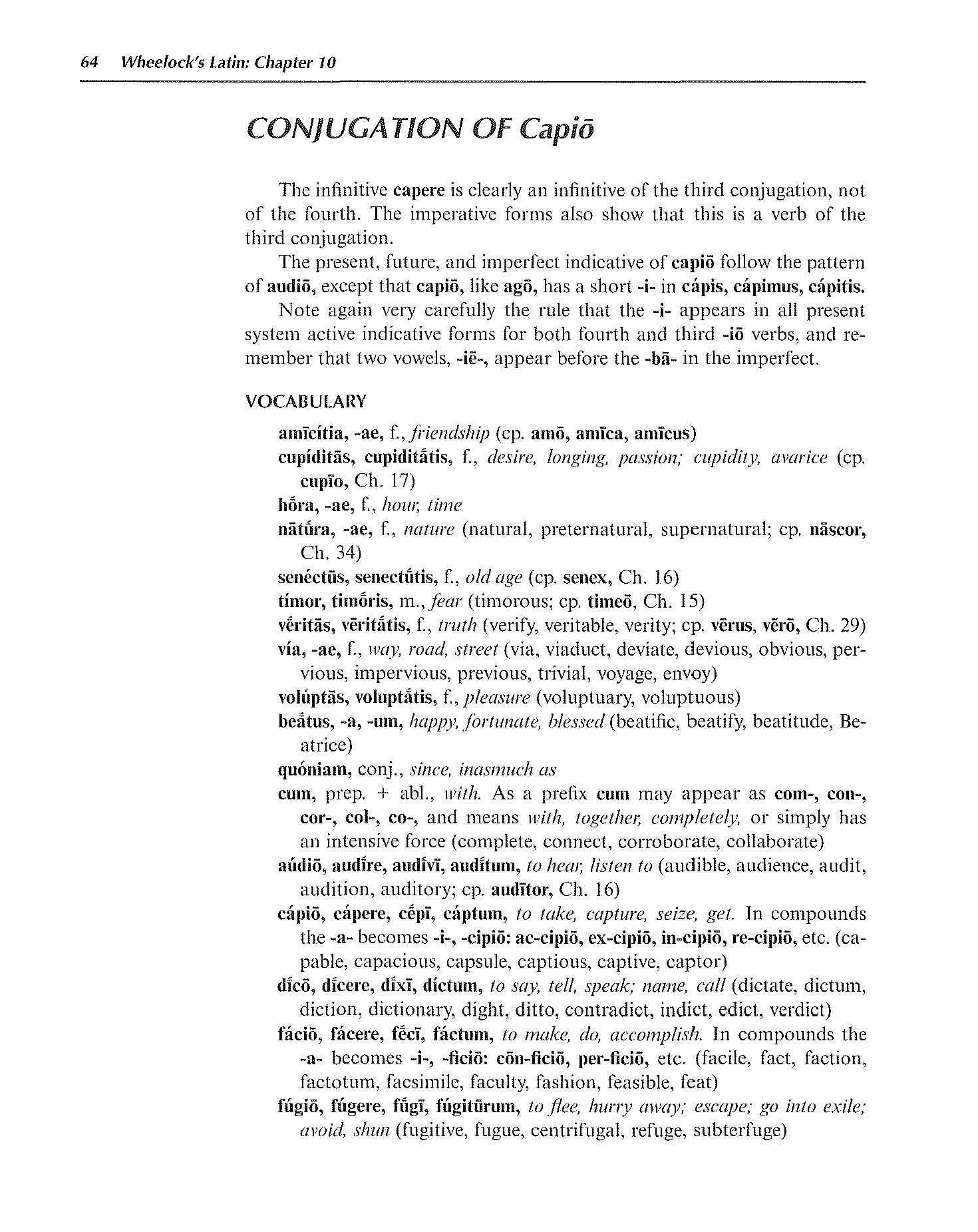
page_listing.tpl
page_subListingDetails.tpl
sub_listingDetails_style1.tpl
sub_listingDetails.title.tpl
capere to capture
capere is a Latin Verb that primarily means to capture.
Definitions for capere
Wheelock's Latin
Verb
- 1
to take, capture, seize, get
- 2
In compounds the -a- becomes -i-, -cipiō: ac-cipiō, ex-cipiō, in-cipiō, re-cipiō, etc.
English derivatives:
capable capacious capsule captious captive captor
Oxford Latin Dictionary
Verb
- 1
To take into the hand, take hold of. (b) to take or pick up (arms).
- 2
To put on, assume (clothing, etc.; also armour).
- 3
To take (food or drink).
- 4
To seize hold of, arrest (a person or his body).
- 5
To catch by hunting, fishing, etc. (b) (of birds or beasts of prey). (c) to gather, reap, get, (crops or other produce.
Sentences with capere
Latin to English
Tū mē (nōs) nōn capiēs.Compare You will not capture me (us).
Vōs eōs (eās, ea) nōn capiētis.Compare You will not capture them.
Tyrannī iūra cīvium dēlent quōs capiunt.Compare Tyrants destroy the rights of the citizens whom they capture.
Cum in aliam terram proficīscī cōnārētur, ā mīlitibus captus est.Compare When he tried to set out into another land, he was captured by soldiers.
Illōs cum amīcīs ibi capiētis.Compare You (pl.) will capture those men there with (their) friends.
Oppugno vere moenia unus urbs, sed in unus urbs universus capio Graecia.Compare You will besiege indeed the walls of one city, but in one city you will have captured the whole of Greece.
Quotidīe capio urbs, quotidīe diripio.Compare The city is being daily captured, it is being daily plundered.
Conjugation table for capere
Cactus2000
| ACTIVE | |
| Indicative present | Indicative imperfect |
| capiō capis capit capimus capitis capiunt | capiēbam capiēbās capiēbat capiēbāmus capiēbātis capiēbant |
| Indicative perfect | Indicative pluperfect |
| cēpī cēpistī cēpit cēpimus cēpistis cēpērunt / cēpēre | cēperam cēperās cēperat cēperāmus cēperātis cēperant |
| Indicative future | Indicative future perfect |
| capiam capiēs capiet capiēmus capiētis capient | cēperō cēperis cēperit cēperimus cēperitis cēperint |
| Subjunctive present | Subjunctive imperfect |
| capiam capiās capiat capiāmus capiātis capiant | caperem caperēs caperet caperēmus caperētis caperent |
| Subjunctive perfect | Subjunctive pluperfect |
| cēperim cēperis cēperit cēperimus cēperitis cēperint | cēpissem cēpissēs cēpisset cēpissēmus cēpissētis cēpissent |
Infinitive present capere Infinitive perfect cēpisse Infinitive future captūrum esse | Imperative present cape capite Imperative future capitō capitō capitōte capiuntō |
| PASSIVE | |
| Indicative present | Indicative imperfect |
| capior caperis capitur capimur capiminī capiuntur | capiēbar capiēbāris / capiēbāre capiēbātur capiēbāmur capiēbāminī capiēbantur |
| Indicative perfect | Indicative pluperfect |
| captus sum captus es captus est captī sumus captī estis captī sunt | captus eram captus erās captus erat captī erāmus captī erātis captī erant |
| Indicative future | Indicative future perfect |
| capiar capiēris / capiēre capiētur capiēmur capiēminī capientur | captus erō captus eris captus erit captī erimus captī eritis captī erunt |
| Subjunctive present | Subjunctive imperfect |
| capiar capiāris / capiāre capiātur capiāmur capiāminī capiantur | caperer caperēris / caperēre caperētur caperēmur caperēminī caperentur |
| Subjunctive perfect | Subjunctive pluperfect |
| captus sim captus sīs captus sit captī sīmus captī sītis captī sint | captus essem captus essēs captus esset captī essēmus captī essētis captī essent |
Infinitive present capī Infinitive perfect captum esse Infinitive future captum īrī | Imperative present capere capiminī Imperative future capitor capitor - capiuntor |
| PARTICIPLE | ||
| Participle present active | ||
| Nom. | capiēns | capientēs |
| Gen. | capientis | capientium |
| Dat. | capientī | capientibus |
| Acc. | capientem | capientēs |
| Abl. | capiente | capientibus |
| Participle future active | ||
| Nom. | captūrus | captūrī |
| Gen. | captūrī | captūrōrum |
| Dat. | captūrō | captūrīs |
| Acc. | captūrum | captūrōs |
| Abl. | captūrō | captūrīs |
| Participle perfect passive | ||
| Nom. | captus | captī |
| Gen. | captī | captōrum |
| Dat. | captō | captīs |
| Acc. | captum | captōs |
| Abl. | captō | captīs |
| Gerundive | ||
| Nom. | capiendus | capiendī |
| Gen. | capiendī | capiendōrum |
| Dat. | capiendō | capiendīs |
| Acc. | capiendum | capiendōs |
| Abl. | capiendō | capiendīs |
| Gerund | Supine | |
| Nom. | capere | captum |
| Gen. | capiendī | captū |
| Dat. | capiendō | |
| Acc. | capiendum | |
| Abl. | capiendō | |
Data sources
Notes
- Definitions
- Frederick M. Wheelock, Wheelock's Latin, 6th ed., rev. Richard A. LaFleur (New York, NY: HarperCollins Publishers, 2005): 64.
- P. G. W. Glare, Oxford Latin Dictionary, Vols. 1-8 (Oxford: Clarendon Press, 1982): 269.
- Word frequencies
- Christopher Francese, "Latin Core Vocabulary," Dickinson College Commentaries, last modified 2014, http://dcc.dickinson.edu.
- Paul B. Diederich, The Frequency of Latin Words and Their Endings, PhD diss., (Columbia University, 1939).
- Louis Delatte, Suzanne Govaerts, Joseph Denooz, and Etienne Evrard, Dictionnaire fréquentiel et index inverse de la langue latine [Frequency Dictionary and Inverse Index of the Latin Language] (Liège, Belgium: Laboratoire d'analyse statistique des langues anciennes de l'Université de Liège [L.A.S.L.A.], 1981): 120.
Bibliography
Allen, Joseph H. Allen and Greenough's New Latin Grammar for Schools and Colleges: Founded on Comparative Grammar. Edited by James B. Greenough, George L. Kittredge, Albert A. Howard, and Benjamin L. D'Ooge. Boston, MA: Ginn & Company, 1903.
Crystal, David. A Dictionary of Linguistics and Phonetics. 6th ed. Oxford, UK: Blackwell Publishing, 2008.
Delatte, Louis, Suzanne Govaerts, Joseph Denooz, and Etienne Evrard. Dictionnaire fréquentiel et index inverse de la langue latine [Frequency Dictionary and Inverse Index of the Latin Language]. Liège, Belgium: Laboratoire d'analyse statistique des langues anciennes de l'Université de Liège (L.A.S.L.A.), 1981.
Diederich, Paul B. The Frequency of Latin Words and Their Endings. PhD diss., Columbia University, 1939.
Francese, Christopher. "Latin Core Vocabulary." Dickinson College Commentaries. Last modified 2014. http://dcc.dickinson.edu/latin-vocabulary-list.
Gildersleeve, Basil L., and Gonzales Lodge. Gildersleeve's Latin Grammar: Third Edition, Revised, and Enlarged. 3rd ed. London, England: Macmillan and Co., 1903.
Glare, Peter G.W. Oxford Latin Dictionary. Vols. 1-8. Oxford, England: Clarendon Press, 1982.
Krüger, Bernd. "Latin Conjugation Tables." Cactus2000. Accessed May 5, 2023. https://latin.cactus2000.de/index.en.php.
Pierson, Nick. "Sound of Text." Accessed October 26, 2019. https://soundoftext.com.
Wheelock, Frederick M. Wheelock's Latin. 6th ed. Revised by Richard A. LaFleur. New York, NY: HarperCollins Publishers, 2005.
Wiktionary Contributors. "Victionarium." Wikimedia Foundation, Inc. Updated March 18, 2019. https://la.wiktionary.org/wiki/Victionarium:Pagina_prima.
Citation
Chicago (17th ed.)
Allo Contributors. "capiō, capere, cēpī, captum (v.) - Latin Word Definition." Allo Latin Dictionary. Last modified . Accessed February 20, 2026. http://ancientlanguages.org/latin/dictionary/capio-capere-cepi-captum.
Entry created on . Last updated on .









